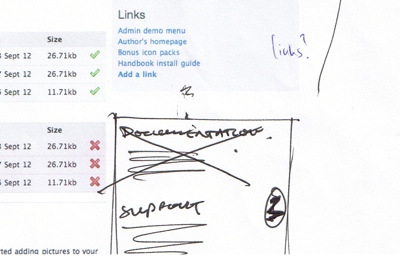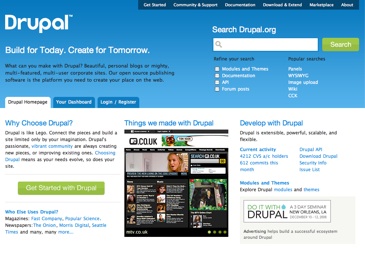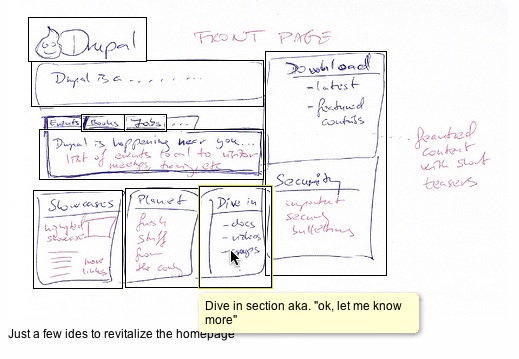I was initially a bit surprised seeing Mark and Leisa running a physical suggestion box in Washington DC for the Drupal 7 user experience rework. After all, we had IRC channels and twitter for the session rooms to discuss presentations, forums and groups to get input and all kinds of nice digital tools to discuss ideas. However, using paper probably made for a good way to actually drive people to the table, get them pull a piece from the stack and write down their suggestion. This allowed Mark and Leisa to engage them in a conversation, get a feel of what they think, and resulted in a better outcome compared to just using all these nifty digital tools.
I've had a very similar experience with the drupal.org redesing on paper. Initially, I had this idea to set up a website with an image annotation tool and get people discuss the wireframes using that. Drupal had a stable module called fotonotes, which mapped the library originally used to build out the Flickr feature to Drupal, but I liked the concept of the image annotate module better. This later one was based on jQuery UI, but had some flaws. So I contacted the author and sent in fixes and test results. As the project page says:
Compared to Fotonotes (another module for placing notes on images), this module uses the latest jQuery (shipped with Drupal 6) and the state of the art jQuery UI module, while Fotonotes is dependent on an old (last updated in 2006) custom JavaScript library.
After all my work put into making this work, I realized we might as well have a better way to bootstrap our work. We were just heading into Drupalcamp Germany in Cologne, the Drupal.org upgrade sprint in Cambridge MA and the Drupal.org redesign sprint in Paris in succession. All these events could use materials to look at and discuss with the drupal.org redesign. I figured that having the wireframes on screen does not allow for all the flexibility that we need.
So I ended up printing out all the pages of the redesign from Mark on my home printer and went on a "world tour" with them. Using the printouts turned out to have a fantastic effect on our productivity, since we could use them in an amazing number of ways:
- In Cologne, we used the printouts to define what kind of major feature areas we need and delegated research to some people. Having been able to see multiple pages at once helped us identify patterns much more easily compared to just staring at pages one by one on screen.
- In Cambridge, we looked at the pages to identify the initial feature set for our Solr rollout and used to target project module improvements so they are implemented with the target features in mind.
- In Paris, the pages were used by designers to discuss remaining tasks, they were used to note problems with missing comment styling elements for example. People picked up pages and run with them to implement landing pages and design elements. We even scored a coffee stain on one of the pages, showing people actually made the mockups of their own.
- Finally (so far), in Washington DC, we were able to sit down with Mark Boulton and discuss all the notes the themers and feature implementors made and got annotations on some of the pages from Mark.
 The printed pages were better then just looking at the digital versions, since we could code on our laptops while looking at the printouts, compare different pages, sit around pages and discuss and have all this goodness at our fingertips.
The printed pages were better then just looking at the digital versions, since we could code on our laptops while looking at the printouts, compare different pages, sit around pages and discuss and have all this goodness at our fingertips.
How can the notes on paper get fed into our process? Well, through the sprints, people working on features were there in person, so they could see and absorb all the notes. Since we are more open now with tasks better defined and broken down for a bigger team of contributors, it became important to make note of the diversions we are going to take from the design. Therefore I made scans of the pages we discussed and documented decisions on the redesign implementors group. There were also finer grained themer discussions, which were rolled into the themer TODO list.
The spotlight time for paper in the drupal.org redesign might be over with issue queues and wiki pages taking on, but it was nevertheless a fun time using these printouts so far.
 Drupal.org is in need of some makeup, and we know this quite well. It runs on the old and stable Drupal 5 codebase, while Drupal 6 is out for almost one year (and is just as stable but way more useful especially with all the new contributed modules). Drupal.org also sports a design which was last refreshed in 2005. So it does not really give justice to the software it helps to flourish. Therefore the Drupal Association hired Mark Boulton to help with a community based redesign of the site, and
Drupal.org is in need of some makeup, and we know this quite well. It runs on the old and stable Drupal 5 codebase, while Drupal 6 is out for almost one year (and is just as stable but way more useful especially with all the new contributed modules). Drupal.org also sports a design which was last refreshed in 2005. So it does not really give justice to the software it helps to flourish. Therefore the Drupal Association hired Mark Boulton to help with a community based redesign of the site, and 
